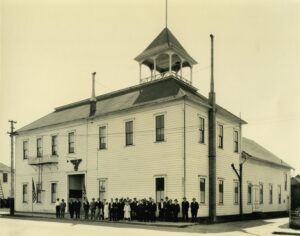Today when coastal residents want to read a new best seller, or find a Book-On-CD to listen to while commuting, or search for a good books on bugs for a six year old, they can turn to the libraries in their local communities. (We’re pretending there is not a pandemic going on that limits access to library services and buildings.)

How, and when, did the coast get libraries? For the next few weeks, the Kelley House Calendar will look at the evolution of the libraries in Fort Bragg, Mendocino, and Point Arena. Today’s column begins this short history and what led to their creation. In future weeks we’ll see how a county library system came into being.
Mendocino County has only been settled by migrating settlers for 170 years. Back then a family’s library may have consisted of just one book, a family bible. The more money they had the more books they owned. Anything readable, including newspapers, was passed hand to hand until it was reduced to tatters. Early schools often could not afford to provide free textbooks. Parents were expected to go to the general store and buy them for their kids.
Local readers needed books. Anyone with an elementary education might want to read when they had free time. Many immigrants wishing to apply for citizenship needed to have a copy of the U. S. Constitution to study or have it read to them. Kids never stopped asking the who? when? where? questions, and those answers could be found between the covers of books.
Many people today are unaware of the number of religious and fraternal organizations that once existed along the coast. New arrivals would join these groups, often called lodges or orders, because they were a link to the Old World, or a person knew they shared the same religion, or workers had a common employment basis.
When wives came west and joined husbands, they formed sisterhoods, or auxiliaries, to their husbands’ organization. It was a way to make friends, become a part of the community, and receive mutual support in difficult times.
In exchange for small membership dues, a group would offer a hospital insurance plan to help an injured worker, or a burial plan when someone died. Many Chinese groups, incorrectly called “tongs,” would promise to send a member’s bones back to China when they died.
Some of these groups also supported libraries or public reading rooms that were housed in their meeting rooms and halls. There, books written in the members’ native languages could be shared, and instruction in the English language could take place.
Research shows Mendocino’s Odd Fellows Hall on the corner of Ukiah and Kasten Streets had a library, as did Fort Bragg’s Kalevala Lodge (now Lions Hall on Redwood Ave.) and the Little River Improvement Club near Van Damme State Park. Next week’s column will look at how these varied groups contributed to the development of coastal libraries.